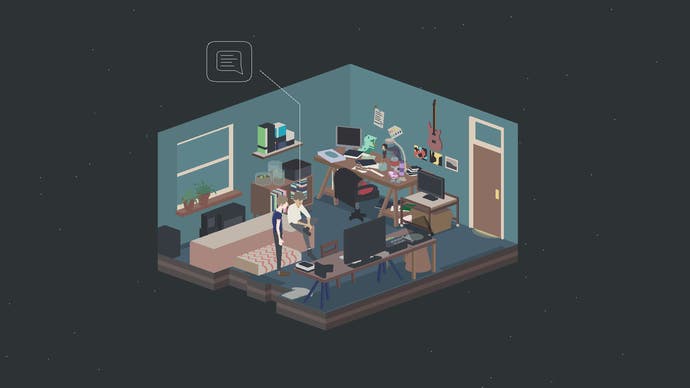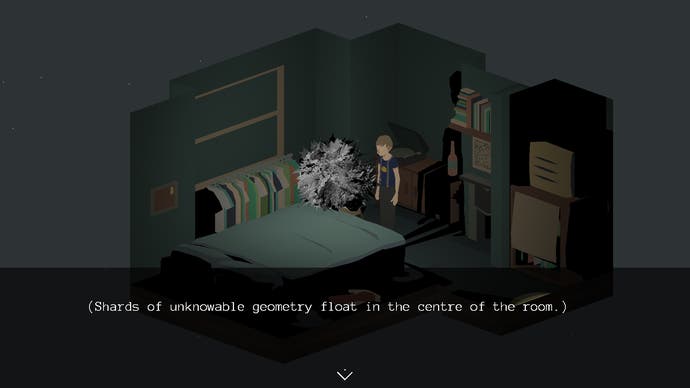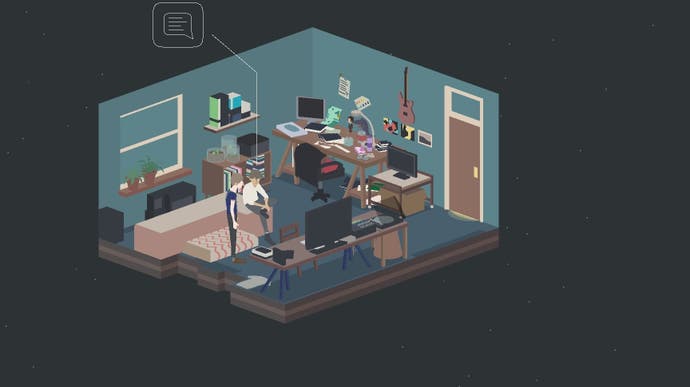No Longer Home is a heartfelt goodbye to an important stage in life
Edgware Route Zero.
We're taking Rezzed online over the next few days, presenting sessions and bringing you highlights of what's new and interesting in the world of independent games. You can find more details on exactly what's going on over here, and we'll be bringing you more write-ups over the coming days.
Bo and Ao's bedroom is a mess. The bed is unmade, clothes litter the floor next to it. When I walk Ao over to the laundry hamper, they think about doing something about its worrisome state before deciding against it. You can find similar signs of apathy all over No Longer Home. Rotting fruit in a bowl. Unwashed dishes. Books spilled all over a desk. It's no surprise to find out that the house I'm exploring belongs to former students - it was clear from the moment Bo said "I feel like I'm always the one emptying the bin", echoed, not much later, by Ao's "I always forget to recycle the empty toilet paper rolls." The familiarity of it all makes me shiver.
I warm to No Longer Home immediately, not just for how it evokes nostalgia by showing the parts of student life I'm definitely not nostalgic for. I'm fascinated by how comfortable it is in taking inspiration from Kentucky Route Zero - from its low poly art style to the way the camera zooms in and retracts to the calming, yet eerie soundtrack that sometimes even brings the Americana-esque twang of guitars to a shared flat in London.

In conversations, I can pick if I'm the one asking the question or giving the answer, and No Longer Home switches between different points of view several times. Bo and Ao, who find themselves with the task of packing up and moving out after finishing university, are the focal points. Bo, with their meandering gait and bad posture, seems to be slipping into depression over the prospect, too tired to do much of anything. Ao, who is moving back to their native Japan, seems a little more robust, but stares wistfully at the beloved chaos all the same.
That's really all I do - I lead the characters around their house, listen to conversations and hear what each of them has to say about the various objects I find. It's intimate enough that I want to keep learning more about everyone. Sometimes I move the house around to better see everything - not the camera, the house - and with each turn, the walls make a sound like shifting bricks. Never since The Sims have I felt like I was holding an entire world in my palm like that.
Developer Humble Grove describes the game as semi-autobiographical, episodic magical realist point and click adventure, and at first it seems the only supernatural element to be found are the fungi that keep growing onto wet towels and the mould that keeps reappearing under fresh paint. But Bo and Ao find weird structures around the flat, images and floating spheres that trigger timeskips. There's also the not too small matter of Lu, a giant creature reminiscent of a tree who just likes to... chill, I guess.

The magic, the at times unsettling atmosphere, fits astoundingly neatly into a game mostly about people hanging out. It's strongly reminiscent of Mutazione, my favourite from 2019, but No Longer Home also lists Gone Home, Firewatch, Virginia and of course KRZ among its influences. After hearing about the game first in 2018 during its Kickstarter, I'm very glad for this competent life sign and can confirm things are off to a flying start.
If you'd like to have a further look at No Longer Home, you can download the short prequel Friary Road on the game's Kickstarter page and official homepage or the first episode, titled "29", on Steam.

